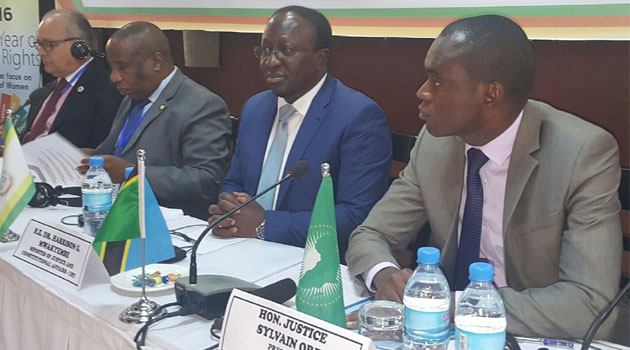
The court’s President Justice Sylvain Ore said failure to implement decisions rendered by the court is a serious threat to the rights of litigants who seek justice at the continental court that was established to safeguard human rights/BERNARD MOMANYI
ARUSHA, Tanzania Nov 23 – African countries have been urged to always implement decisions rendered by the African Court on Human and People’s Rights (AfCHPR) as a means of safeguarding its legitimacy and authority.
The court’s President Justice Sylvain Ore said failure to implement decisions rendered by the court is a serious threat to the rights of litigants who seek justice at the continental court that was established to safeguard human rights.
“In my view this is a monumental challenge because every time the authority of the judge is questioned, it is the rights of litigants that are under threat,” he said when addressing delegates at the opening of a symposium to celebrate the court’s 10th anniversary in Arusha.
For the African court to grow in legitimacy and authority, he said, it has to have the means to accomplish its mission.
“There is no greater challenge for a judge than not seeing the litigant enjoy the benefit of the decisions it has rendered,” Justice Ore said.
The court was established by virtue of Article 1 of the Protocol to the African Charter on Human and Peoples’ Rights on the Establishment of an African Court on Human and Peoples’ Rights, (the Protocol) which was adopted by Member States of the then Organization of African Unity (OAU) in Ouagadougou, Burkina Faso, in June 1998. The Protocol came into force on 25 January 2004.
It is funded by the African countries as well as various international partners, including the Deutsche Gesellschaft für Internationale Zusammenarbeit which is commonly known as GIZ.
“It is for this reason that each player of the system should be able to ask the question as to the use of investing so many resources to establish a court when the enforcement of its decisions is completely unsustained or left entirely to the discretion of States without any follow-up mechanism,” Justice Ore said in the challenge posed to the delegates from across Africa attending the symposium.
The African Court on Human and Peoples’ Rights is a continental court established by African countries to ensure the protection of human and peoples’ rights in Africa. It complements and reinforces the functions of the African Commission on Human and Peoples’ Rights.
At the opening of a symposium to mark the 10th anniversary of the court’s existence, Africa was urged to improve the state of human rights to be able to meet international norms and standards.
Delegates attending the symposium noted that even though there was remarkable improvement in the state of human rights in the continent; much more remain to be done to improve the situation.
“You will agree with me that the human rights conditions in many African Member States do not meet the continental and international norms and standards,” Commissioner for Political Affairs at the African Union Commission Dr Aisha Abdullahi who was represented by the commission’s Political Affairs Director Dr Khabele Matlosa said.









































